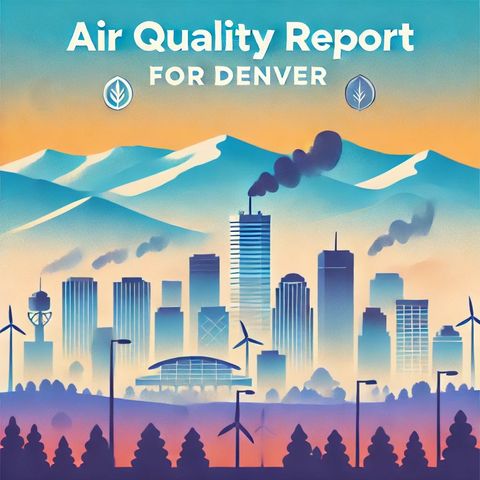Denver's Air Quality Sees Moderate Levels, Some Sensitivity Concerns

Download and listen anywhere
Download your favorite episodes and enjoy them, wherever you are! Sign up or log in now to access offline listening.
Denver's Air Quality Sees Moderate Levels, Some Sensitivity Concerns
This is an automatically generated transcript. Please note that complete accuracy is not guaranteed.
Description
As of today, Denver's air quality presents a mixed situation due to a combination of seasonal weather patterns and environmental conditions. The air quality index, or AQI, is a standardized...
show moreToday, the AQI for Denver shows moderate levels, meaning the air quality is generally acceptable; however, there may be some health concerns for a very small number of people who are unusually sensitive to air pollution. This situation is relatively typical for this time of year when changing weather patterns can influence pollution levels. The moderate classification suggests that the outdoor air is safe for most individuals, but those with respiratory conditions or heightened sensitivity might experience minor effects.
One contributing factor to today's air quality is the presence of particulate matter, specifically PM2.5 and PM10. Particulate matter consists of tiny particles or droplets in the air that can be inhaled and cause health issues. Such particles often increase during colder months due to residential heating, vehicle emissions, and industrial activities, yet today's levels remain within moderate ranges, meaning that most individuals will not be significantly affected.
Furthermore, ground-level ozone, a common pollutant during the warmer months, usually decreases as temperatures drop, which is beneficial for the overall air quality in Denver. However, inversion layers—a phenomenon where a stable layer of warm air traps colder air underneath—can occasionally lead to a temporary build-up of pollutants near the ground, exacerbating any existing issues. Fortunately, today's weather conditions are not strongly indicative of this occurrence.
Climate and geography also play a crucial role in Denver's air quality. The city's location in a valley surrounded by mountains can lead to stagnant air masses where pollutants accumulate. As such, fluctuations in air quality are often experienced when wind patterns shift or when weather fronts move through the region, clearing out accumulated pollutants.
Efforts to improve air quality continue in Denver, with initiatives tailored towards reducing emissions from transportation, encouraging the use of clean energy, and promoting public transit and active transportation. These measures, combined with monitoring and forecasts, help residents stay informed and take necessary precautions on days when air quality is less than optimal.
In summary, today's air quality in Denver is moderate, posing little risk to the general populace. It is a reflection of both natural and human-influenced factors that regularly impact the region's air clarity, especially during transitional seasons. Keeping informed about air quality levels remains important for individuals with specific health concerns, ensuring they can take appropriate action as needed.
Information
| Author | QP-5 |
| Organization | William Corbin |
| Website | - |
| Tags |
Copyright 2024 - Spreaker Inc. an iHeartMedia Company
